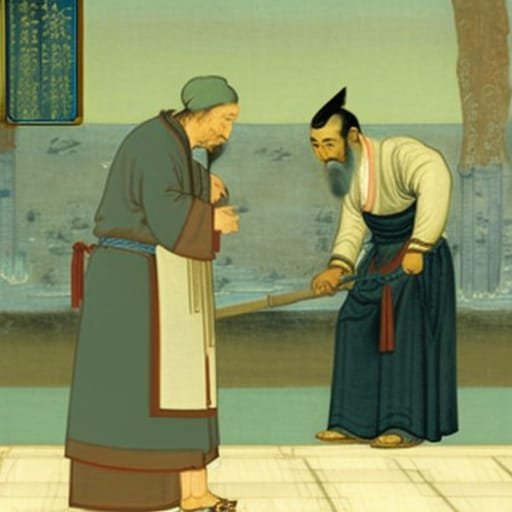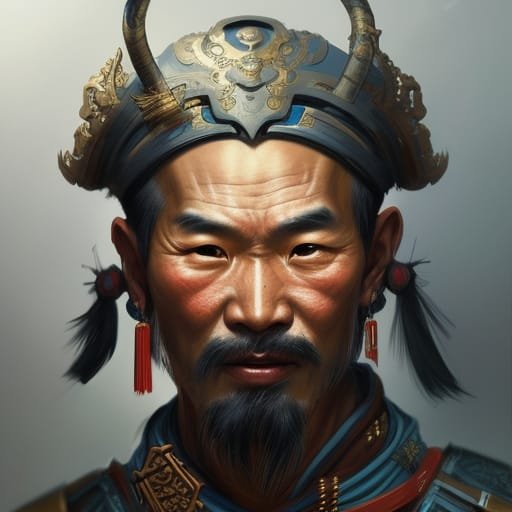
MEDITATIONS: ZHUANGZI, CHAPTER THIRTY-THREE
In his aloneness he came and went, joined only by heaven and earth and the purest kernels of imponderable spirit, but still never arrogantly separated himself off from the creatures of the world, for he reprimanded none of their views of right and wrong and thus was able to get along with worldly conventions.
— Zhuangzi

MEDITATIONS: ZHUANGZI; CHAPTER THIRTY-TWO
“It was I who caused your son to become a Mohist! Why, why have you failed to see my good deed? Why do you not visit my grave, where I have already become an autumn fruit hanging from a cypress tree?”
— Zhuangzi

MEDITATIONS: ZHUANGZI; CHAPTER THIRTY-ONE
What worries the Son of Heaven . . . are things like the disharmony of yin and yang . . . Now you, sir, are not in the position of a ruler or feudal lord . . . yet you capriciously take it on yourself to . . . transform and educate all people equally—aren’t you being way too much of a busybody?”
— Zhuangzi

MEDITATIONS: ZHUANGZI, CHAPTER THIRTY
“I have heard that your majesty has a liking for the play of the sword, so I have come to meet with you on the strength of my swordplay. . . . This is a swordplay that displays false appearances to the opponent, leading him on with the lure of gain, thrusting forth only after he does, but preceding him in landing the blow.”
— Zhuangzi

MEDITATIONS: ZHUANGZI, CHAPTER TWENTY-NINE
“Anyone who can be regulated with promises of profit and admonished with slick words is what I would call a stupid, ignorant, ordinary sort of person.”
— Robber Zhi
Zhuangzi

MEDITATIONS: ZHUANGZI, CHAPTER TWENTY-EIGHT
Well, if you can’t help it, then just go with it; do not hate the imponderable spirit in you! If you cannot control your longings, but then you force yourself not to obey them, this is called a double injury.
— Zhuangzi

MEDITATIONS: ZHUANGZI, CHAPTER TWENTY-SEVEN
These spillover-goblet words give forth new meanings constantly, so that all are harmonized through their Heavenly Transitions. They extend on and on without break and thus can remain in force to the end of one’s years.
— Zhuangzi

MEDITATIONS: ZHUANGZI, CHAPTER TWENTY-SIX
It is only when you know uselessness that you can know anything about the useful.
— Zhaungzi

MEDITATIONS: ZHUANGZI, CHAPTER TWENTY-FIVE
It is only someone who transforms every day together with all things who can remain always one and unchanging.
— Zhuangzi

MEDITATIONS: ZHUANGZI, CHAPTER TWENTY-FOUR
Thus do they comply and align themselves with whatever is brought by every passing year, instead of letting change be their very thing-hood! Thus do they drive their bodies and inborn natures about, sinking beneath the ten thousand things, never turning back for their entire lives. How sad!
— Zhuangzi

MEDITATIONS: ZHUANGZI, CHAPTER TWENTY-THREE
“Walk without knowing where you are going, stop without knowing what you are doing, slither along with all things, joining in their undulations. . . . This is what is called melting the ice and breaking through the freeze—but are you capable of it?”
— Zhuangzi

MEDITATIONS: ZHUANGZI, CHAPTER TWENTY-TWO
“You and I are nowhere near it, because we know it.”
— Zhuangzi

MEDITATIONS: ZHUANGZI, CHAPTER TWENTY-one
“He is the kind of person who is genuine: . . . How could I, Choiceless, be worthy even to mention such a person?”
— Zhuangzi

MEDITATIONS: ZHUANGZI, CHAPTER TWENTY
Zhuangzi was traveling in the mountains when he came upon a huge tree, luxuriantly overgrown with branches and leaves. A woodcutter stopped beside it, but in the end chose not to fell it. Asked the reason, he said, There is nothing it can be used for.”
— Zhuangzi

MEDITATIONS: ZHUANGZI, CHAPTER NINETEEN
Duke Huan burst out laughing and said, “That is what I saw!” . . . Before the end of the day, without his even realizing it, his illness was gone.
— Zhuangzi

MEDITATIONS: ZHUANGZI, CHAPTER EIGHTEEN
I don’t know: is there anything that is really good, or isn’t there?
Nor do I know whether what the ordinary people nowadays do, what they find their happiness in, is really happiness or not.
— Zhuangzi

MEDITATIONS: ZHUANGZI, CHAPTER SEVENTEEN
The becoming of things is like a galloping horse, transforming with each movement, altering at each moment. What should you do? What should you not do? No matter what, you will be spontaneously transforming!
— Zhuangzi

MEDITATIONS: ZHUANGZI, CHAPTER SIXTEEN, PART TWO
When the correctness belonging to another is applied to oneself, it only beclouds one’s intrinsic virtuosities.
— Zhuangzi

MEDITATIONS: ZHUANGZI, CHAPTER SIXTEEN, PART ONE
When conscious understanding and tranquility can come together and nourish one another in this way, a harmonious coherence of the two emerges from the inborn. Inherent virtuosity is just this harmony, and the Course is just this coherence.
— Zhuangzi

MEDITATIONS: ZHUANGZI, CHAPTER FIFTEEN
To be lofty though without any carved-in-stone intentions, cultivated though without humankindness and responsible conduct, governing though without merit and fame, at leisure though without confinement to the rivers and seas, long-lived without manipulating the vital energies . . . this is the Course of heaven and earth, the intrinsic virtuosity of the sages.
— Zhuangzi